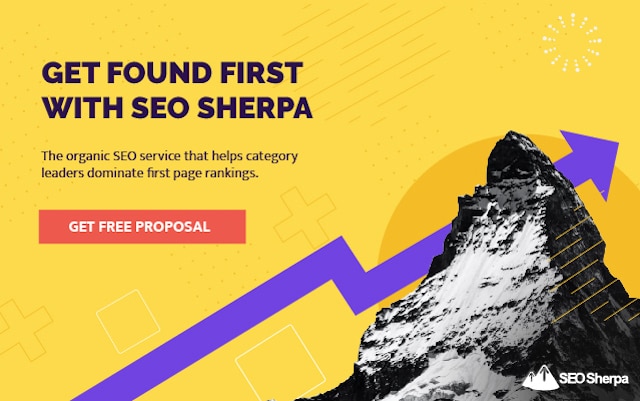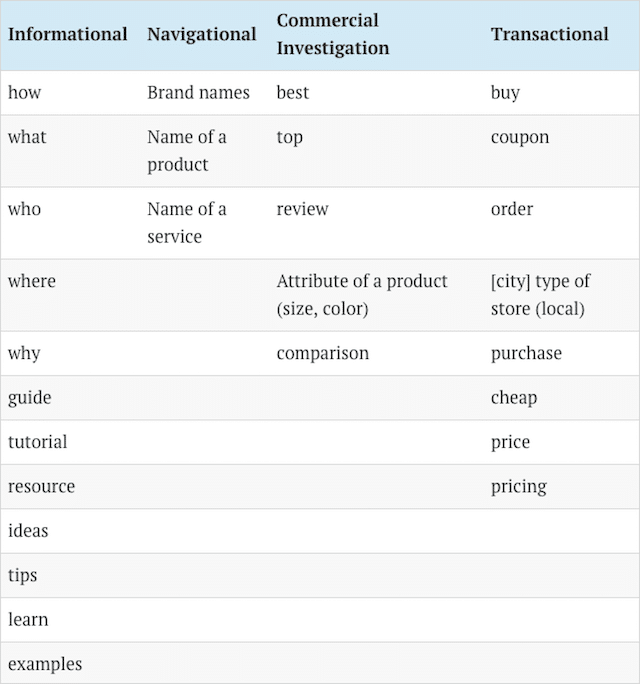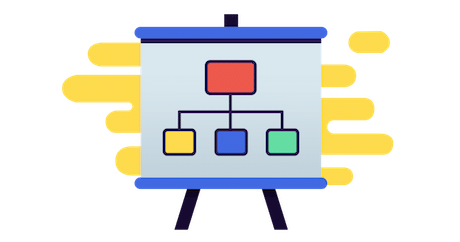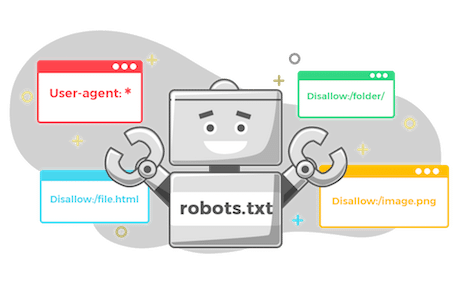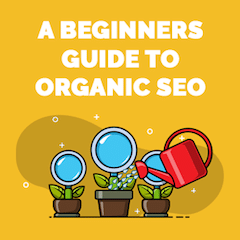
From precisely what it is, to how you can rank high in natural search results, step-by-step.
While, at first glance, this post may seem geared towards beginners…
I can assure you, anyone who has an interest in SEO, even seasoned experts, will walk away with at least one organic search strategy they can implement immediately to grow their traffic (for free)!
I’m covering:
- What is organic SEO and why is it important?
- How does organic SEO work?
- What is the difference between organic search and paid search?
- How organic SEO differs from local SEO
- Getting started with organic SEO in 2021
- And much more!
Let’s dive right into it.
How does your website score? Get a free instant audit that will uncover the biggest SEO issues affecting your site, and how to fix them.
What Is Organic SEO and Why Is It Important?
The term organic SEO stands for organic search engine optimization.
Organic SEO is the practice of using white hat SEO strategies to increase your website traffic and improve your site’s presence in non-paid search engine results.
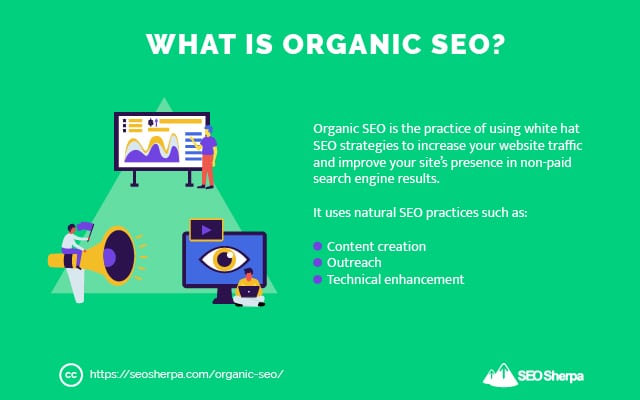
The word organic is used to distinguish between natural search engine optimization methods and paid tactics for ranking in SERPs.
But what exactly is a SERP, and why is it important to SEO?
SERP 101: Understanding Google’s SERP features
When you have a question you want answering like “what is the best dishwasher” or “pizza place near me”, where do you turn?
Google, Yahoo, Bing, or some other search engine.
You are not alone, the majority of website clicks, roughly 68% originate with a search on a search engine.
When you (or anyone else) type – or say – something into a search engine, the search engine results page (SERP) is what you get back.
A typical SERP will offer search users two different types of content: pay-per-click ads known as “paid search” and organic search results.
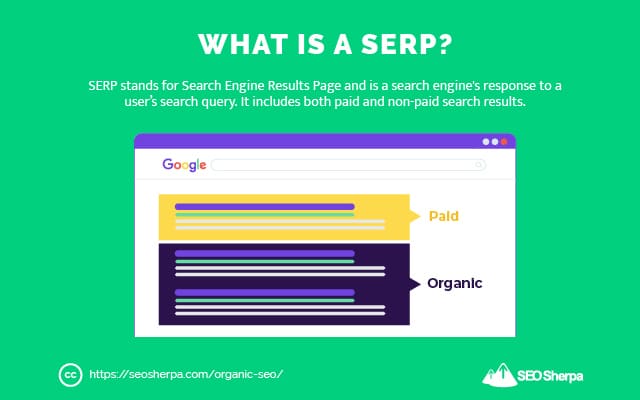
Appearing in the organic search results is especially valuable because as compared to the paid results, organic search results receive considerably more clicks:
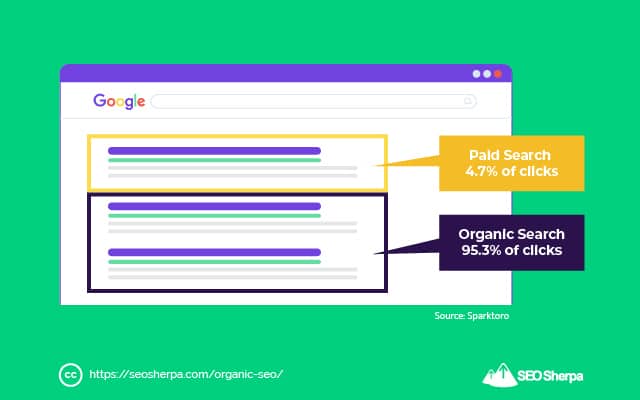
Google also comes with a host of SERP features like maps, rich snippets, knowledge panels, and video results. All of these result types excluding sponsored ads (paid search) are influenced by organic SEO techniques.
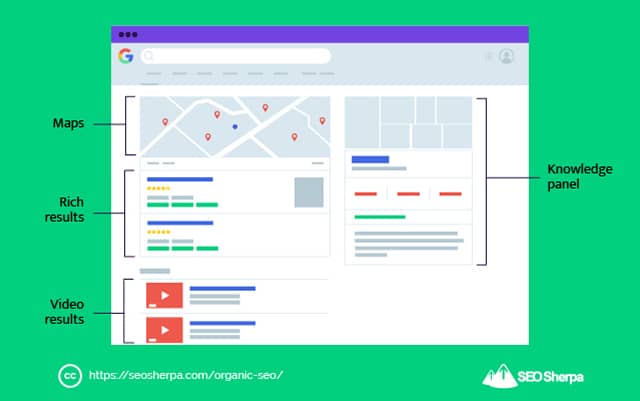
When you compare today’s SERPs to the original 1998 Google search results page, today’s SERPs are far more complex.

While we can see the evolution of Google’s SERPs over its 20-year timeline, we still need to talk about how websites get ranked in these all-important SERPs.
To do that, we need to understand how search engines work.
How Does Organic SEO Work?
The results that search engines provide to their users aren’t picked randomly or happen by chance.
Each search engine uses a proprietary, complex algorithm to determine what results would best answer a search user’s query.
Without too much detail, search engines employ crawlers, also known as bots or spiders, to scour the internet and gather information. A crawler will collect all types of content from visual (e.g. images or video) to text-like articles or blog posts.
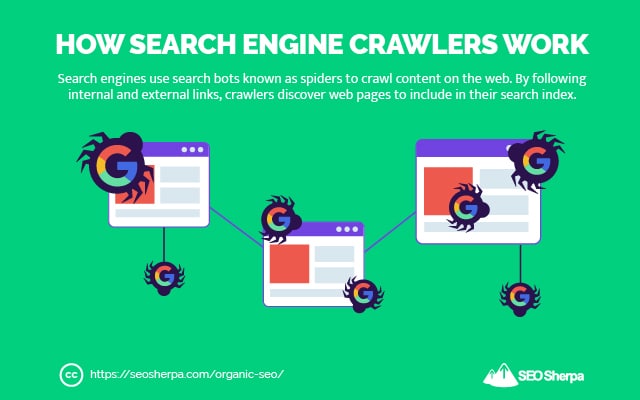
To find this content a crawler begins their “crawl” from a known web page. Through internal and external links, crawlers will try to understand the context of each connected web page.
The information collected about a web page is included in the search engine’s database, also known as a search index. Each web page is cataloged based on its context.
This is where those complex algorithms come into play.
A Brief History of Google Search Algorithms
Whenever a search is performed, the search engine goes into its massive database and pulls out what it believes will be the most relevant results for that specific search query.
These organic search results are selected by the search algorithm’s many ranking factors. Each search engine differs in what it considers as an important ranking factor.
In Google’s case, the search engine uses over 200 ranking factors, many unknown to SEOs.
Throughout the 20+ years of SEO work, Google has provided clues as to which ranking factors “determine which results” get returned for a search query.
Many industry experts have also conducted surveys and studies to verify which ranking factors are given more weight by Google. According to SparkToro’s most recent survey, 1,500+ professional SEOs believe these are the 26 most important Google ranking factors.
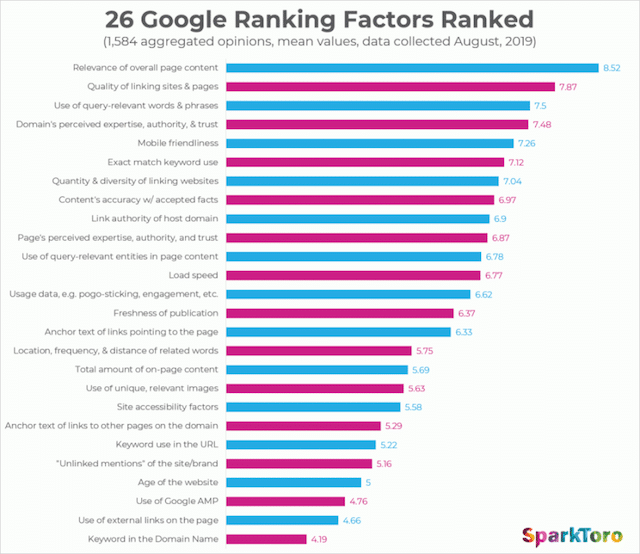
There have also been numerous SEO experiments that have demystified the process behind Google’s ranking factors and search algorithm.
You can probably see where this is going.
By optimizing your web pages for these ranking factors, your site has a better chance of appearing high in organic search results.
This is the essence of SEO.
But with any industry, there are both good actors and bad ones.
White Hat & Black Hat SEO: What’s the Difference?
From its beginning, search engines have been in a cat and mouse game with people who have tried to game search algorithms through various underhanded tactics to rank higher in the SERPs.
In the early days of search engines (think the mid-90s and early 2000s), the SEO industry was pretty much the Wild West. Meaning anything goes.
Sure, every search engine had guidelines, but very few marketers took them seriously, and most algorithms were highly game-able.
Plus, in those early days, Google wasn’t the search powerhouse that it is today. In the mid-90s and early 2000s, Google was still trying to compete for search engine market share among giants like Altavista, Yahoo!, Infoseek, and Lycos, to name a few.
(Some of you have probably never heard of these faded search engines before.)
This is where black hat SEO came into play.
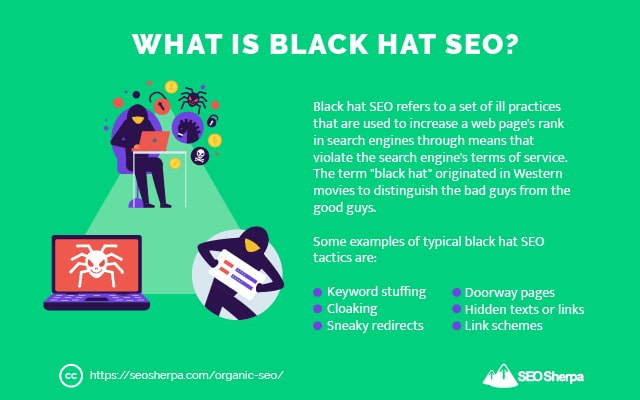
Because search algorithms were easier to manipulate back then, many SEOs used specific tactics like private blog networks (PBNs), doorway pages, keyword stuffing, and link farming to gain higher SERP rankings.
These tactics are considered “black hat” because they violate the search engine’s guidelines.
White hat SEO, on the other hand, is just SEO tactics that follow the rules set out by the search engine’s guidelines.
Take link building, for example.
A white hat SEO link-building tactic would be creating valuable, highly-relevant content that other sites want to link to naturally. A black hat SEO tactic would be hacking a website to inject links into its content.
Eventually, Google and other search engines started updating their algorithms to address these black hat techniques and to improve the quality of results returned for search users.
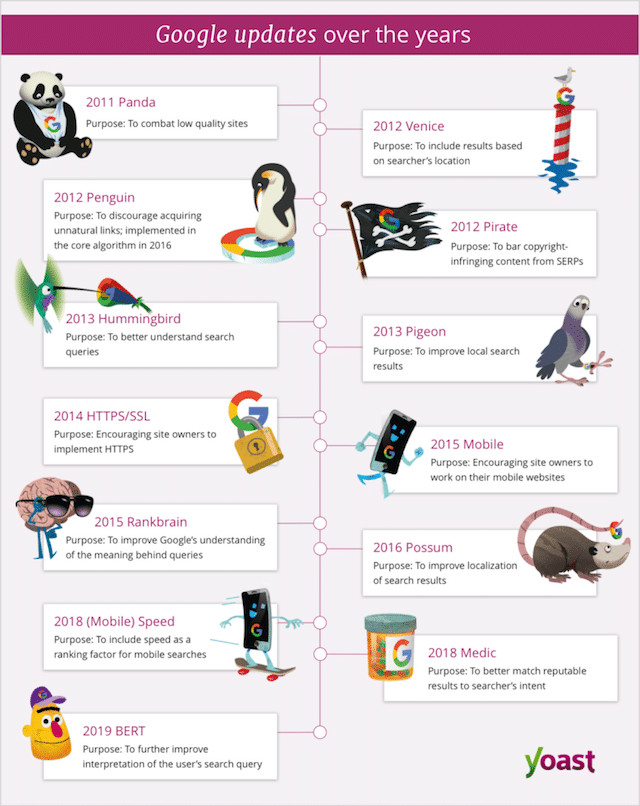
Google makes hundreds of updates to its algorithm per year. Most are minor tweaks, while others are significant changes to its core algorithm.
Understanding Google’s Webmaster Guidelines
To succeed in SEO today, professionals need to align their tactics and strategies to Google’s webmaster guidelines.
Sure, employing some black hat tactics can get results in the short term.
But, as soon as the algorithm catches up with you, your website will drop like a stone.
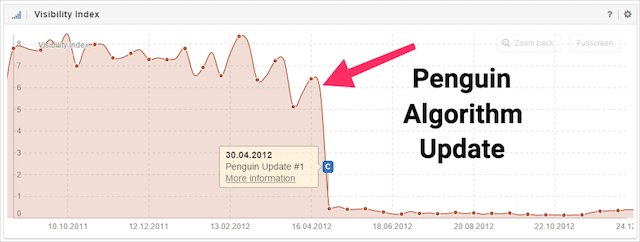
As there are countless guides and articles out there on these webmaster principles, here’s a quick overview of these general best practices.
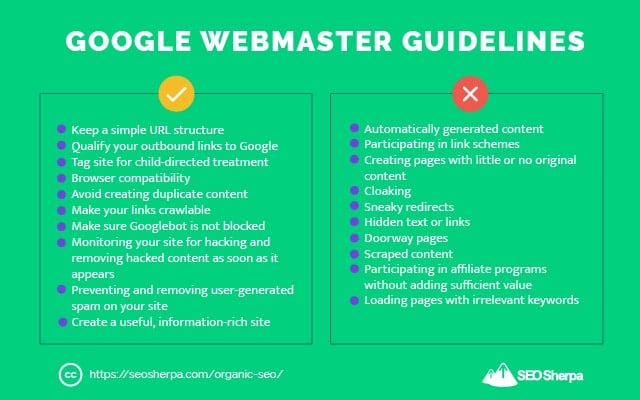
Following these guidelines will help you in building sustainable and long-lasting organic SEO results.
But, as we pointed out already, search engine results don’t only provide ten blue organic links.
And while there are over a dozen types of SERP features that vie for search users’ attention, one of the most significant additions to any SERPs is paid results.
Just what is the difference between paid and organic search results?
Differences Between Paid Search and Organic SEO
Today’s SERPs are more competitive than ever.
Nearly 93% of all Google searchers click on results they find on the first page. The second page of Google SERPs only sees a measly 0.78% clicks. That’s a significant difference in click-through rates (CTRs) for businesses.
This difference in CTRs is why organic SEO is more important than ever.
Since every business competes for user attention in the SERPs, every company is trying to get their business to appear in the first ten results of any organic SERP.
But some companies who fall behind in their SEO efforts with the competition may want quicker entry to that oh-so-precious first-page result. To “earn” those placements, businesses will bid on specific keywords and pay for paid ads.
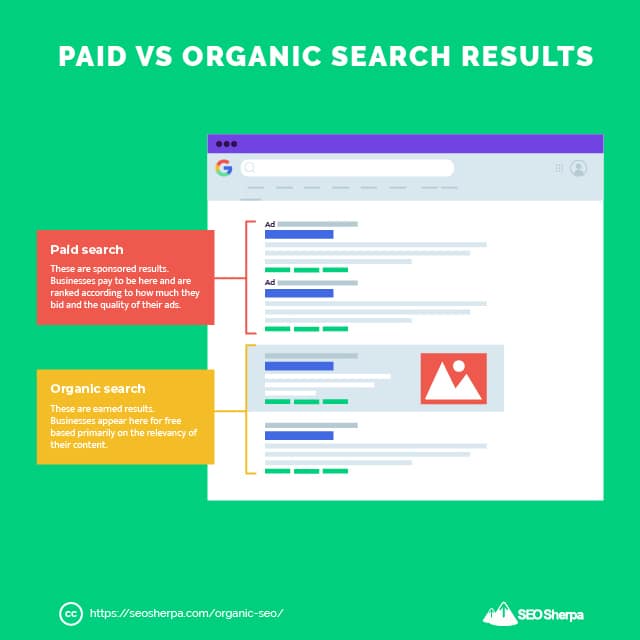
The results you see above the organic search listings are called pay-per-click advertisements (PPC).
Like SEO, PPC has a long and storied past. But for our purposes, the ad placements you see at the top of the first page are “often” determined by the highest bidder in combination with the quality score for the ads.
This is the main difference between paid and organic search. While both search results are to a greater or lesser degree earned placements, to compete in paid search results you need to pay-per-click (PPC) via a Google Ads account.
On the other hand, organic search results are given by Google to businesses that provide the most relevant results for a given search query.
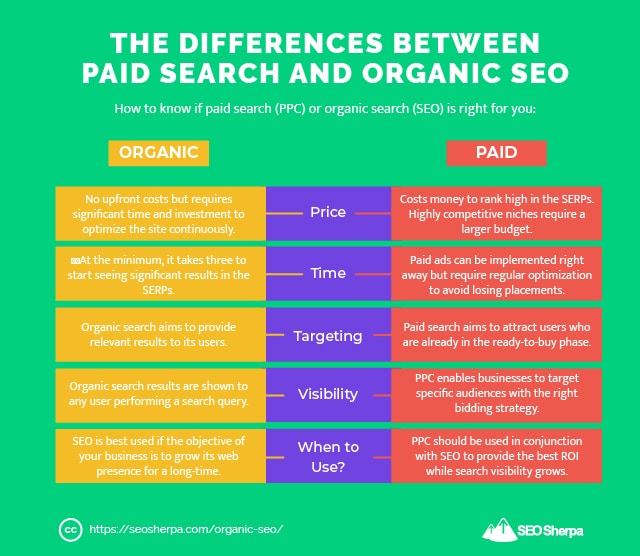
Despite their differences, businesses don’t have to choose one or the other.
As a leading SEO agency, we understand the symbiotic relationship between paid and organic search.
That’s why we have an in-house team of Google Ads specialists that complement our organic SEO services.
So when it comes to deciding between investing in paid ads or organic search, I recommend doing both. Sure, they can survive independently on their own, but together, they’re an incredible search dominating powerhouse.
And as far as SERP features are concerned, don’t think your business is relegated purely to paid results or organic ones. If you’re a brick-and-mortar business, then you may want to focus your efforts around local SEO.
What’s the Difference Between Local and Organic SEO?
While local and organic SEO focuses on strategies and best practices that help your website rank higher in search results, local SEO has a more geographical component.
And the anatomy of a local SERP will differ from traditional search results.
Let’s look at an example of this with the search term “pizza near me”.
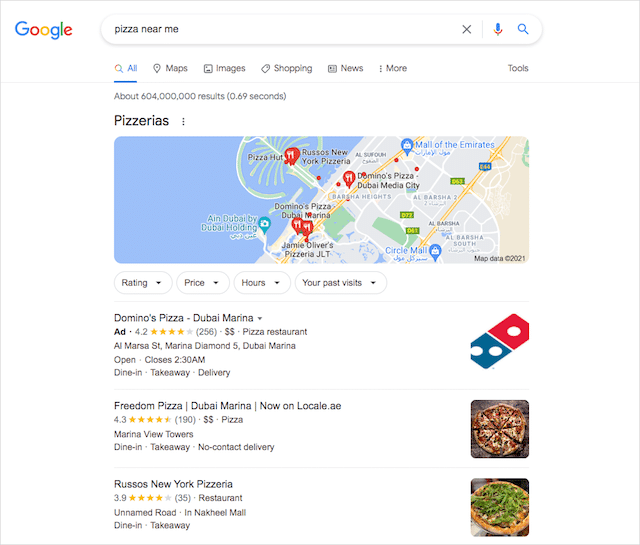
Even though I never specified where I was in the query, Google took my location into account and other location-based factors and delivered results for pizza places in the Dubai area.
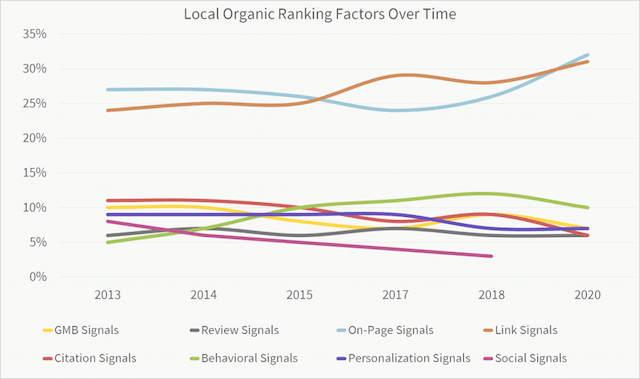
If I were to move to New York or any other city and perform the exact same search, the results would be based on whatever businesses were nearby my new location.
A typical SERP shown for search queries with local intent includes a map pack and organic results.
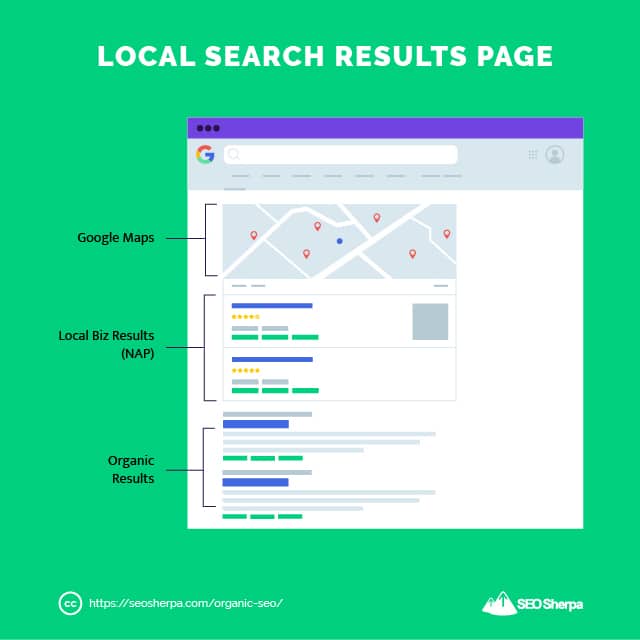
Local SEO is massively essential to small businesses that serve a local area.
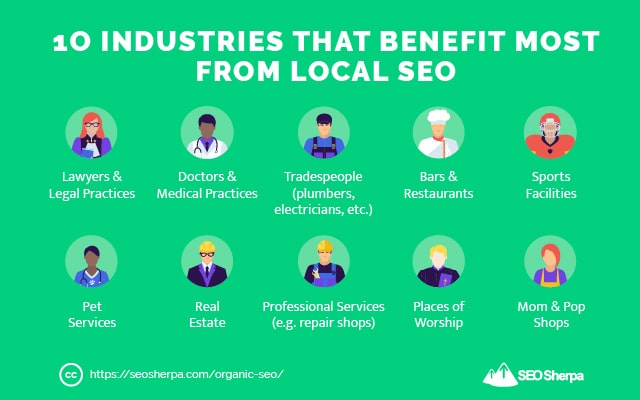
If local search users are relevant to you, check out our step-by-step guide on listing your business on Google search and maps.
With the foundations of how search engines work and SEO’s role in all of it, let’s dive right into high-impact SEO best practices that will deliver meaningful results to your business today.
How to Get Started with SEO in 2021 (With Resources!)
Ready to start dominating Google search with best-in-class SEO practices?
The SEO fundamentals you are about to learn will help move the needle on your search engine rankings and drive more (free) traffic to your site.
I won’t get too technical with any of the SEO tactics and best practices below.
This article is all about getting a solid understanding of the basics of SEO. Which, if done correctly, can undoubtedly rank you higher in SERPs.
Now, let’s look at the five SEO steps you can take today to help potential customers find your website directly from organic search results.
(1). Start with the Key SEO Success Factors
If you are new to the world of search engine optimization, SEO can appear to be a complicated or complex discipline.
The industry moves at a rapid pace, which means SEO is a constantly moving target. It also doesn’t help that the governing bodies, Google and other search engines, persistently adjust the rules through numerous algorithm updates.
But this is not to say that SEO is all about magic tricks or there’s some sort of mystery recipe you need to follow.
Having a thorough understanding of search engine factors will go a long way in positively impacting your SEO success.
To create a well-rounded organic SEO strategy, you should know about the three fundamental pillars of SEO.
On-Page SEO
On-page SEO is all about optimizing the different page elements on your site with best practices to get those individual pages ranking high in search.

There are on-page SEO practices you can focus on, from competitor keyword research and SEO content creation to metadata, that can transform your website into a precious resource for search engines and users alike.
On-page optimization is critical to SEO success because it is one of the few organic search strategies you can fully control.
If you’d like to learn more about different on-page SEO best practices, browse our library of relevant on-page SEO articles:
- How To Write SEO Content That Ranks
- URL Slugs: How to Create SEO-Friendly URLs
- Title Tag Optimization: The Definitive Guide
- How to Write the Perfect Meta Description for SEO
- A Simple (But Complete) Guide To H1, H2 and H3 HTML Heading Tags For SEO
Off-Page SEO
If on-page SEO is all about optimizing the content on your site, then it would stand to reason that off-page SEO focuses on any SEO activities done “off-site.”

Off-page SEO’s goal is to strengthen your site’s popularity and authority in the eyes of search engines. The more trustworthy and reputable your site is, the more ability it will have to rank.
At the heart of off-page SEO is link building. Acquiring many high-value backlinks to your site tells Google (and other search engines) that the content of your pages is highly relevant and trustworthy.
But backlinks are just one of many off-page SEO signals you need to bolster to improve your site’s chances of appearing high in the SERPs.
To learn more about the various off-page SEO strategies out there, check out some of our relevant guides:
- Link Building Strategies for SEO
- The Complete Guide To Anchor Text Optimization
- How To Get Your Business On Google: The Definitive Guide
Technical SEO
Technical SEO focuses on the crawl-ability, visibility, and performance of your website.
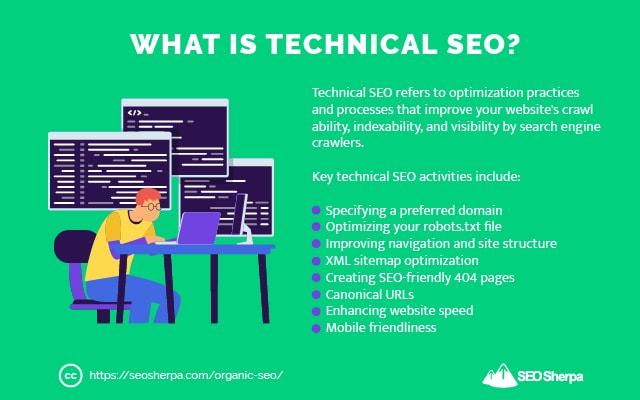
Technical SEO activities enable search engines to more effectively understand what your website is all about. When done right, technical SEO can contribute to better search rankings and opportunities to win rich results from your competitors.
Here are some common technical SEO best practices from SEO Sherpa’s library to help you get started:
- What Are Rich Snippets? The Comprehensive Newbie-Friendly Guide
- Google Core Web Vitals: A Simple (But Complete) Guide
- Robots.txt: The Ultimate Guide for SEO
- How to Speed up Your Website: 15 Quick and Easy Fixes
- 404 Error Pages: The Ultimate Guide for SEOs (with 50+ Examples)
While there are other facets of SEO out there, like international SEO and enterprise SEO you could learn about, you should first familiarize yourself with these three areas of SEO.
Starting with these three fundamental areas of SEO will cover everything you need to meet search engine requirements and provide a great user experience. And when you can do both these things, you are guaranteed success.
Now, let’s dig a little deeper into understanding how people search.
To do that, we need to explore search intent.
(2). Shift Your Focus Towards Search Intent
Google understands that when internet users type a query into the search bar, they have a specific goal in mind.
Understanding this why, called search intent, is an influential cornerstone of modern SEO.
What’s more, satisfying search intent through highly relevant search results is Google’s number 1 priority.
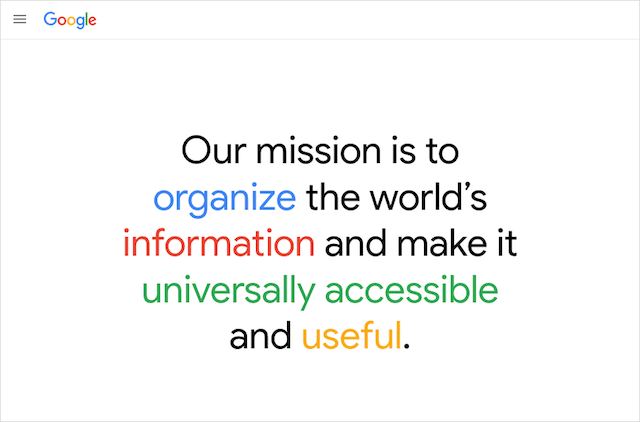
Without fully understanding why internet users perform specific search queries, your business will have difficulty ranking.
Even if you fully optimize other traditional Google ranking signals like backlinks, first page results will constantly be out of reach if your content doesn’t satisfy search intent.
It stands to reason then, to rank high in the modern-day and get more qualified traffic to your website, your content needs to be optimized for search intent.
The Four Primary Types of Search Intent
The majority of search intent typically falls under four main categories. They are:
Informational
When searchers are looking to learn more about a topic or specific information, they perform an informational search. Most informational queries are posed as questions (who is albert einstein?), though not always.
Some examples of informational search intent are:
- “how is tomato sauce made?”
- “weather in new york”
- “html 5 best practices”
- “where is stonehenge located?”
Navigational
When searchers want to visit a specific website, they are performing a navigational search. While most internet users can simply input their brand’s URL into the address bar, some users may not know the exact domain name, and “Googling” would be quicker.
Some examples of navigational search intent are:
- “seo sherpa contact”
- “nike lab”
- “chase bank login”
- “skyscraper technique backlinko”
Transactional
When searchers are ready to buy, they perform a transactional search.
A “purchasing” action can include non-monetary activities like email sign-ups or form submissions. At this point in their buyer journey, the search user already knows what they want to buy. They’re just looking for the right place to make their purchase.
Some examples of transactional search intent are:
- “nike air max sale”
- “london to paris flights”
- “buy iphone 12”
- “cheap sunglasses”
Commercial investigation
When searchers intend to make a purchase but are still unsure what to buy or where to buy from, they perform a commercial investigation search. When users research products, services, or solutions, they are looking to purchase shortly.
Some examples of commercial investigation search intent are:
- “best seo agency dubai”
- “personal trainers nyc”
- “cheapest hotel london”
- “squarespace reviews”
While these four primary search intents are distinct, some queries will cause search intent overlap.
Take “new macbook amazon” as a search term, for example.
The search intent for the above could be both navigational and transactional. The user may be ready to buy a new MacBook and purchase from Amazon’s store.
To better infer search intent, here’s a handy guide from our friends over at Ahrefs.
If you’re still unsure what type of intent a search term has, have a peek at Google’s search results. Certain SERP features will only appear for specific intent types.
For example, the shopping carousel will usually only appear when a search query has transactional intent.
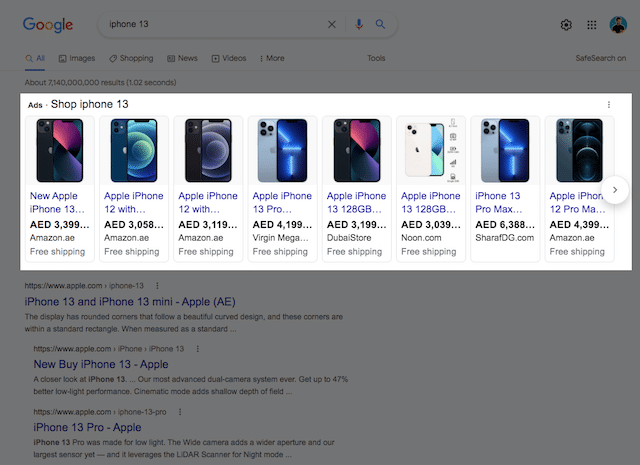
As you might expect, search intent carries with it expectations to how your site delivers its content.
How to Optimize Your Site for Search Intent
At a high level, fulfilling search intent is all about delivering content that search engines and users expect.
While the overall page’s content should be focused on satisfying one of the primary search intents, different elements on your page can be further optimized depending on the intent type.
For example, if your page’s goal is to satisfy informational intent queries, consider optimizing critical on-page elements like page titles, HTML header tags like the H1 and H2s, and descriptions with specific keyword targeting.
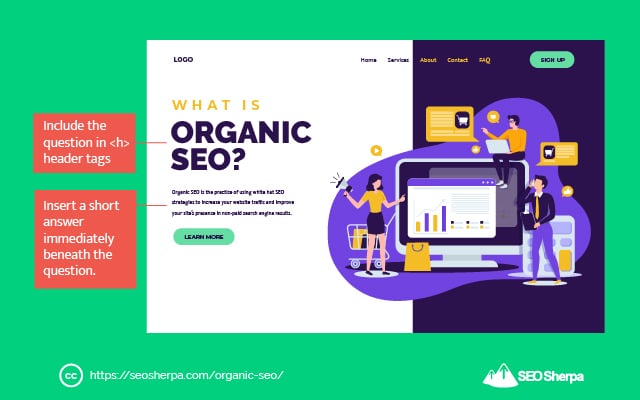
If your focus is transactional search intent, prioritize your page’s conversion process.
CTAs on the page should be clear and eye-catching. The page design should feature high-quality imagery and video and express the value and benefit of your product or service. And, the text of your page should create an emotive response that helps support the purchasing decision.
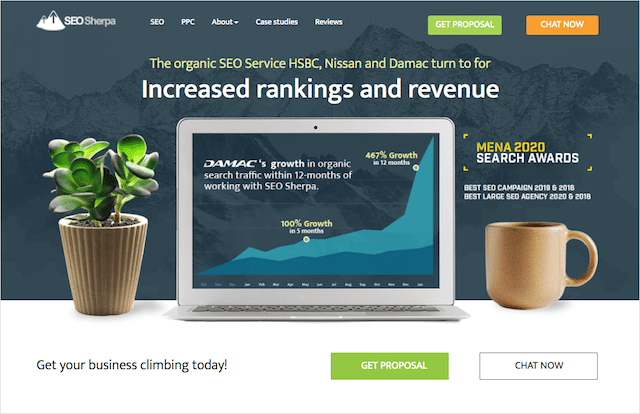
Even if you have search terms that fulfill multiple search intents, prioritize one of them. Trying to hedge your bets across the different types of search intents will dilute your chances of ranking for any intent types.
(3). Know Your Company’s KPIs and Align with SEO Strategies
Since search is the gateway to a great online experience, it’s crucial to align your SEO efforts with your company’s overall goals and objectives.
Remember, SEO isn’t a magic bullet, nor will it provide overnight success to your business.
SEO is at its most effective when it is integrated with your business’s overall marketing strategy.
Let’s say you open up a new pizza restaurant. One of your primary business goals will probably be building brand awareness. The more people that know about your business, the more brand trust it can establish.
And greater brand trust builds positive brand equity.
So what are some marketing strategies you could employ to harness the power of brand awareness?
A few well-known techniques to build brand awareness are local partnerships, optimizing social media, and referral programs.
SEO can be a complementary strategy for all of the brand awareness tactics above.
Take brand partnerships, for example.
By working with another brand, or even an influencer, you can start creating SEO-focused content that’s highly shareable. The brand or influencer could generate content for your business by writing a product review.

You could even offer to write a guest post on their website highlighting your unique product offerings. By running a co-branding campaign, you expand the exposure of your business to a new audience.
And suppose your co-marketing strategy is optimized with SEO best practices like adding targeted keywords to metadata or link building. In that case, search engines will also lift your brand and help you grow your organic online presence.
When you employ SEO to support your company’s overall key performance indicators, don’t forget about incorporating SEO metrics into your reporting as well.
To effectively evaluate SEO success, you will need to use Google Analytics and an SEO platform like Ahrefs or SEMrush. With these tools in hand, you can measure:
- The rank of specific keywords
- Your website’s domain authority
- Increases in organic traffic
- Your site’s bounce rate
- Number of sessions and site visitors
Now that you have a high-level overview of how you can start using SEO to your advantage, let’s look at some resources to further your SEO knowledge.
(4). Participate in Conferences and Webinars
Attending conferences is an excellent way for industry professionals to learn about emerging trends, new tools, and brainstorm solutions and strategies together.
SEO is no exception.
Like other industries, the SEO industry has pivoted to virtual summits and events.
For marketers trying to get their feet wet with SEO, here are some great virtual conferences you can attend to level up your SEO knowledge.
Produced by Whitespark, the Local Search Summit includes talks on the very latest techniques in local SEO, from the industry’s best and brightest — all to help you increase your rankings and conversions from Google’s local results.
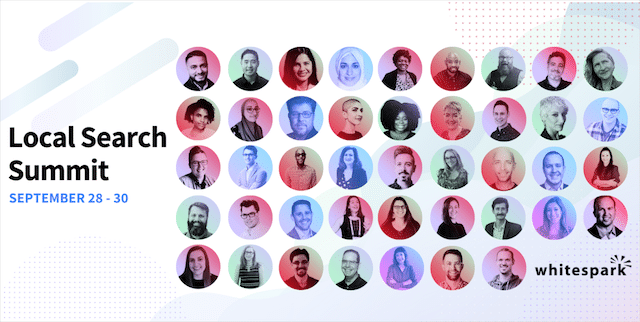
Search Engine Journal hosts a comprehensive virtual SEO summit, covering everything SEO basics to advanced SEO techniques. Over 70 topics are covered in this huge online conference.
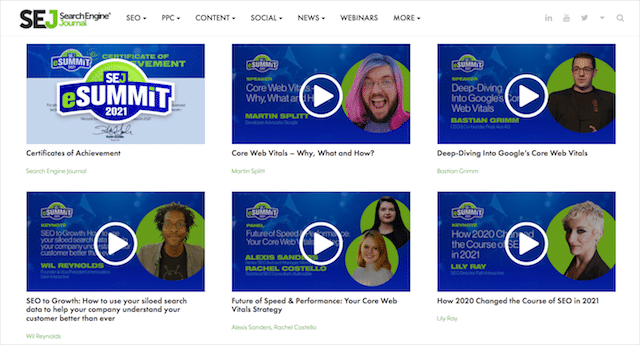
What started out as a few SEOs meeting up in a pub in Brighton, Brighton SEO is now the UK’s largest SEO conference. The conference is well-known for its in-person networking, but also provides its talks online for those who cannot travel, or just want the content.
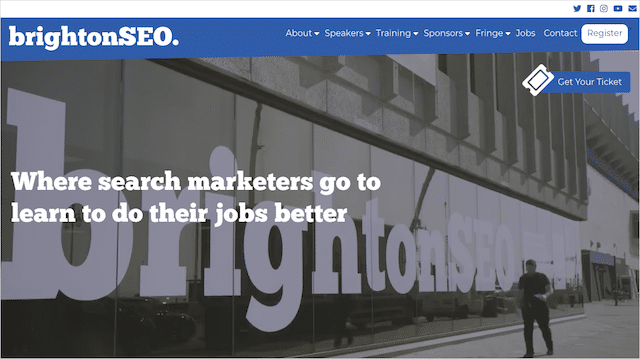
If webinars are more of your thing, then consider participating in these best-in-class educational SEO webinars led by industry experts:
- Live SEO, PPC, Digital Marketing Webinars by SEMrush
- Webinar Wednesdays by Search Engine Journal
- 30 Minutes on the Last 30 Days In Search & Content by Conductor
- Whiteboard Friday by Moz
- Local SEO Webinars by BrightLocal
But don’t restrict your SEO education from virtual conferences or events. Keep reading our next tip to expand your free SEO education and learn about the latest SEO tips.
(5). Stay up to Date with SEO Best Practices by Following These SEO Experts
Having maximum involvement in an industry, particularly one that evolves as much as SEO, will allow you to keep pace with the latest trends and give you a cutting-edge advantage over your competitors.
And one of the best ways to stay up-to-date with what’s happening in and around the SEO industry is by exposing yourself to SEO pioneers and thought leaders.
These SEO veterans have distinguished themselves in search optimization and constantly deliver excellent advice, data, and research.
Ready to get top-notch free SEO advice and grow your knowledge?
Here are 21 industry leaders to help get you started. This list is in no specific order:
Gary Illyes
Webmaster Trends Analyst at Google
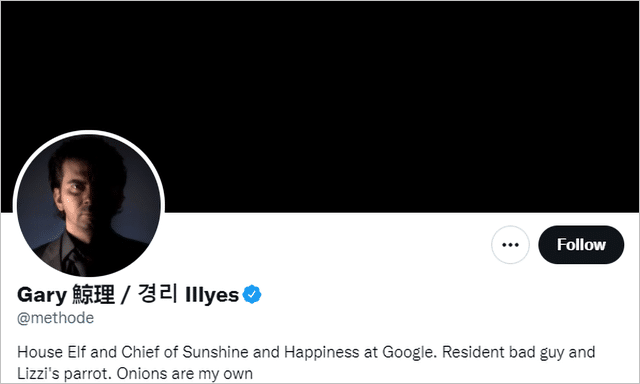
Gary Illyes is a Google Webmaster Trends Analyst and one of SEO’s most influential voices. Gary regularly contributes to Google’s Webmaster Central Blog and is an active participant in the Google Webmaster Forums, helping users debug site issues.
Gary on Twitter
John Mueller
Senior Webmaster Trends Analyst at Google
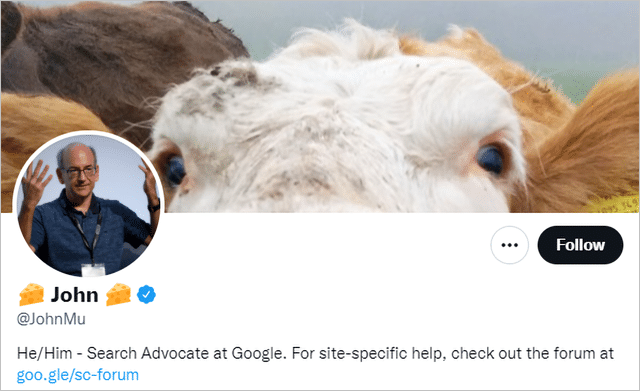
John Mueller is a Webmaster Trends Analyst and developer advocate at Google. When he’s not busy responding to Twitter questions, John regularly hosts the Google Search Central SEO hangouts.
John on Twitter, LinkedIn and YouTube
Areej AbuAli
Founder of Women in Tech SEO & Head of SEO at Papier
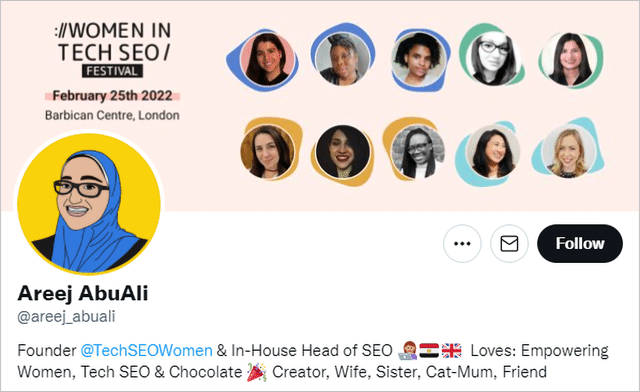
With 8+ years of experience in digital marketing, Areej AbuAli has become a well-known presence in the technical SEO space. Outside of being a distinguished industry speaker, Areej is also known for creating the support network Women in Tech SEO.
Craig Campbell
SEO Consultant at Craig Campbell SEO
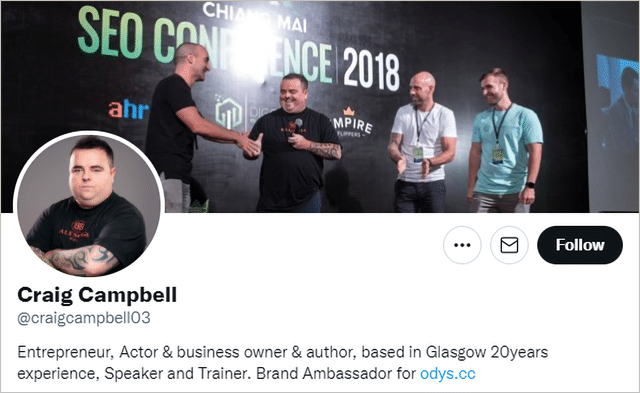
A Glasgow-based SEO entrepreneur with over 20 years of experience, Craig Campbell runs several companies including his own SEO agency. You can find Craig offering valuable SEO tips via his YouTube channel, Facebook group, or as a public speaker at SEO conferences or events.
Cindy Krum
CEO & Founder at MobileMoxie, Inc
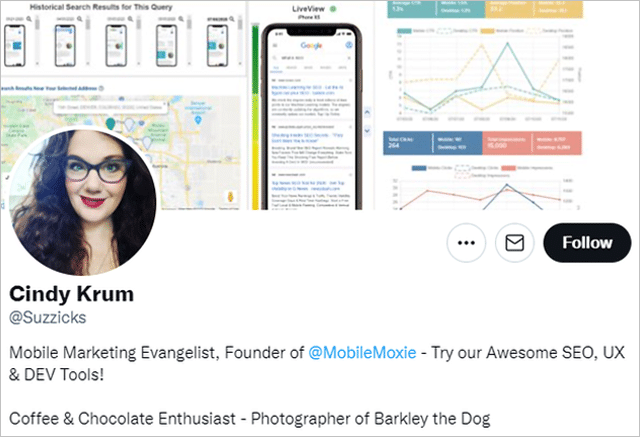
Cindy Krum is the founder of Mobile Moxie, a mobile marketing consulting agency. Alongside her role of CEO, Cindy is also a notable thought leader in mobile SEO, contributing to several industry publications like Search Engine Land, Search Engine Watch, and BrightLocal.
Lily Ray
Senior SEO Director at Amsive Digital
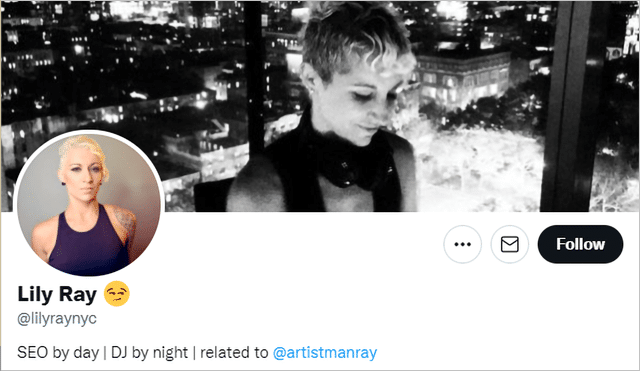
With over 10 years of full-time SEO experience, Lily Ray knows a thing of two about SEO. Lily actively shares her insights and experiences through well-crafted articles found on Search Engine Journal, Search Engine Land, Moz, and more.
Brodie Clark
SEO Consultant at Brodie Clark Consulting
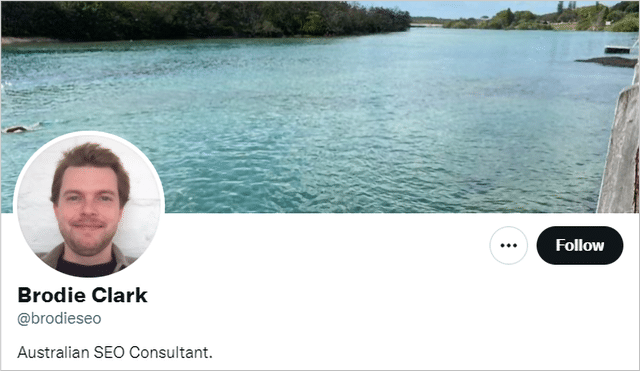
An in-demand SEO consultant, Brodie Clark has worked on SEO campaigns for various local and global companies from Tripadvisor to Airtasker and Envato. Outside of his SEO work, Brodie writes for Moz, Search Engine Land, and Search Engine Journal, focusing on topics around SERP features and the latest developments in SEO.
Brodie on Twitter and LinkedIn
Barry Schwartz
CEO of RustyBrick & Founder of Search Engine Roundtable

Barry Schwartz is the news editor at Search Engine Land and the founder of Search Engine Roundtable, an aggregate SEO publication reporting on the most interesting SEO and SEM forum threads. Barry is also the CEO of RustyBrick, a New York-based web service agency.
Mordy Oberstein
Head of Communications at Semrush
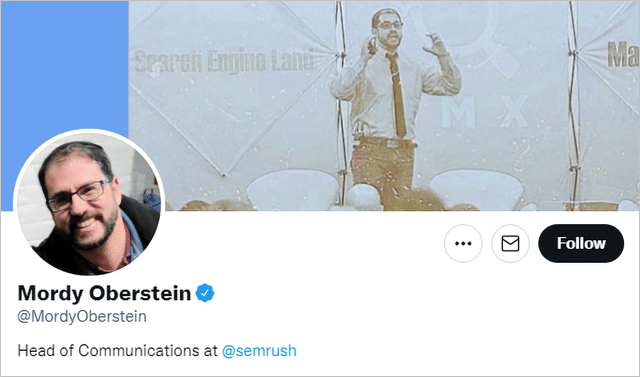
As an SEO thought leader, Mordy Oberstein wears many hats. Previous to his role as Head of Communications at Semrush, Mordy worked as the Chief Marketing Officer for Rank Ranger and served as the liaison to the SEO community at Wix. You can find his writing and advice in various publications like Search Engine Journal, Edge of the Web, and the Search Engine Roundtable.
Michael King
Founder of iPullRank
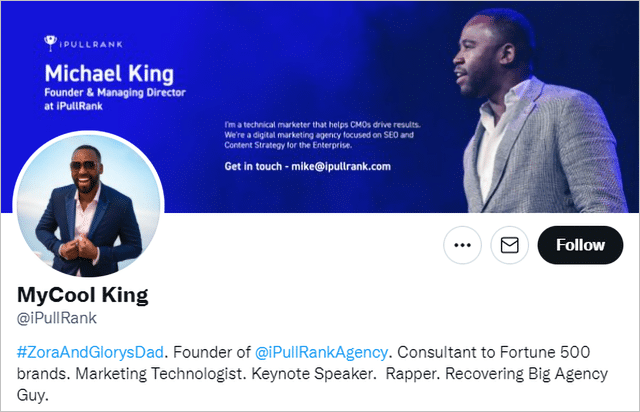
Founder of digital marketing agency iPullRank, Michael King has led SEO campaigns for numerous global companies like HSBC, Etsy, and Ralph Lauren. As a marketing technologist, Michael has written about his pioneering approaches to technical SEO, content marketing, and enterprise SEO. Michael has even launched a film about technical tactics.
Michael on Twitter and LinkedIn
Kevin Indig
Director of SEO at Shopify
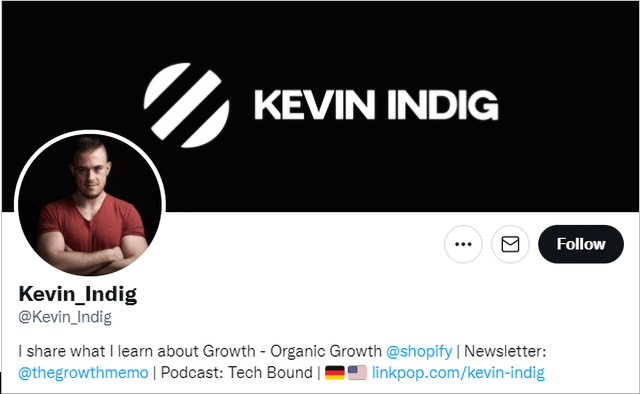
A data storyteller, Kevin Indig writes essays on SEO, tech, and data aggregation and analysis. In his professional life, Kevin is the director of SEO at Shopify.
Cyrus Shepard
Founder of Zyppy
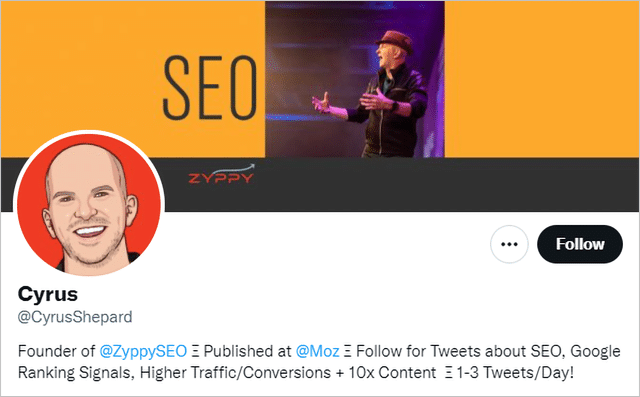
Cyrus Shepard is the founder of Zyppy, an SEO software and consulting company. Cyrus also regularly contributes to the Moz blog, covering numerous SEO topics like link building, Google ranking signals, and keyword research.
Marie Haynes
Owner at Marie Haynes Consulting Inc.
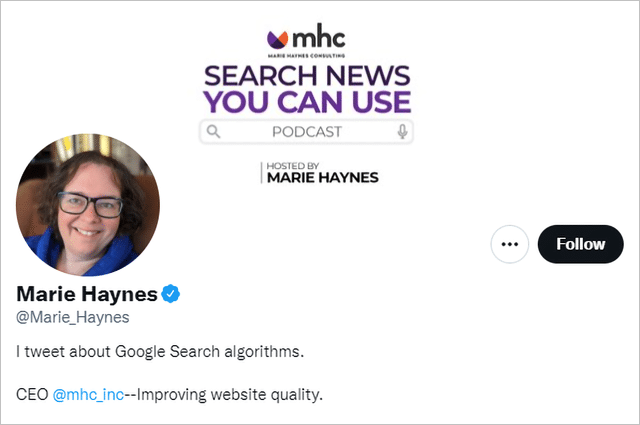
Recognized as a leader in the SEO space, Marie Haynes is the CEO of Marie Haynes Consulting Inc. Marie’s weekly SEO newsletter, Search News You Can Use provides helpful insights, advice, and recommendations on the most important Google algorithm updates.
Nik Ranger
Senior Technical Lead SEO Specialist at StudioHawk
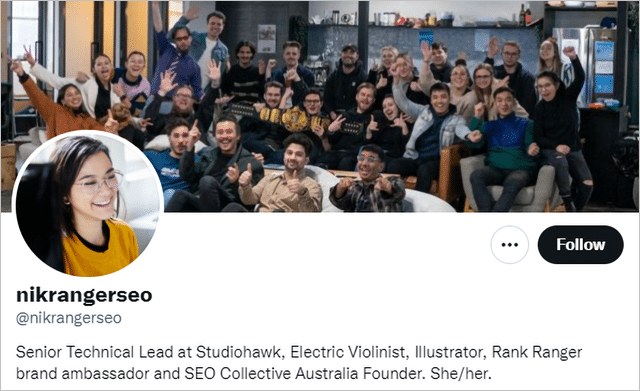
As Studiohawk’s Senior Technical Lead, Nik Ranger has a penchant for technical SEO audits, data analysis, and site architectures. You can find Nik actively tweeting her thoughts on technical SEO as well as her love for all things data graphs.
Ross Hudgens
Founder & CEO at Siege Media
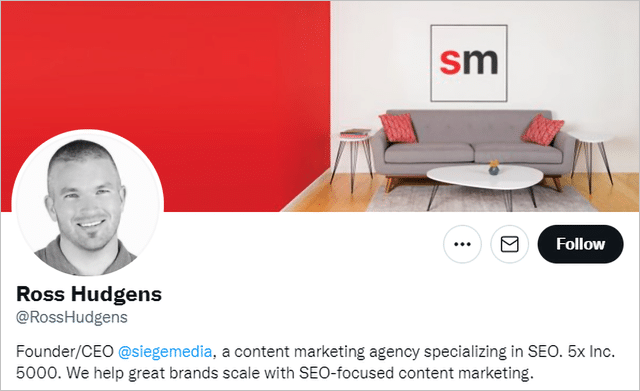
Ross Hudgens is the founder and CEO of Siege Media, a content marketing agency and one of Inc’s Best Workplaces. Ross regularly publishes on Siege Media’s blog and is a frequent presence at notable SEO conferences like MozCon, SearchLove, and many others.
Britney Muller
SEO Consultant & Founder of Data Sci 10
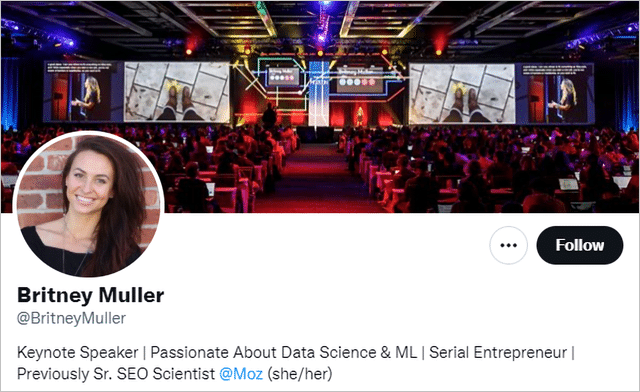
A passionate data scientist, Britney Muller is the founder of Data Sci 101, an online data science resource website. Previous to creating her startup, Britney served as the senior SEO scientist at Moz, leading the company’s research and development.
Britney on Twitter and LinkedIn
Ryan Stewart
Owner at Webris
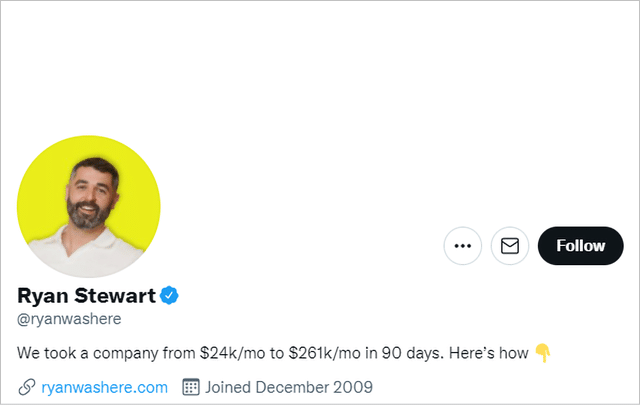
A veteran digital marketer with 13+ years of experience, Ryan Stewart has developed comprehensive SEO campaigns for numerous clients like Target and Best Buy. Ryan regularly shares his SEO insights in numerous digital publications like Inc., Forbes, and Ahrefs. He’s the founder of the SEO training website The Blueprint.
Matthew Barby
VP of Marketing at HubSpot
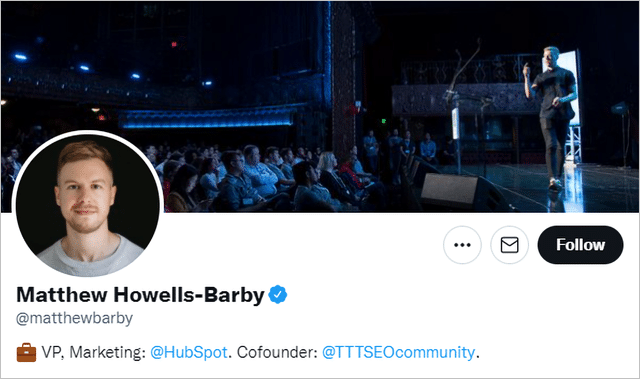
Matthew Howells-Barby is the VP of Marketing at Hubspot and co-founder of the Traffic Think Tank, an SEO accelerator. Much of Matthew’s Hubspot articles focus on SEO content optimization and technical SEO updates.
Matthew on Twitter and LinkedIn
Rand Fishkin
Co-Founder & CEO of SparkToro
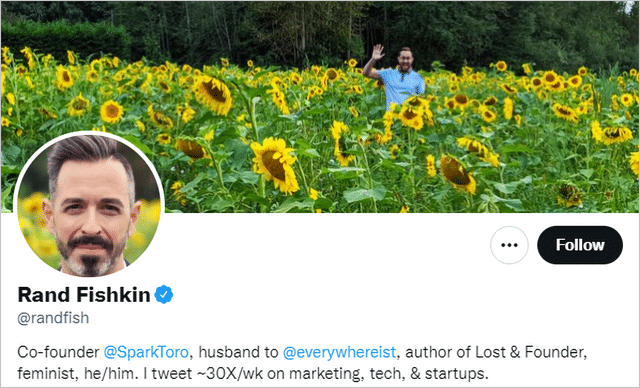
Formerly the CEO of Moz, Rand Fishkin’s latest company, SparkToro, is a market research software company. Rand regularly contributes to the SparkToro blog or he can be found actively tweeting about marketing and tech.
Tim Soulo
CMO at Ahrefs
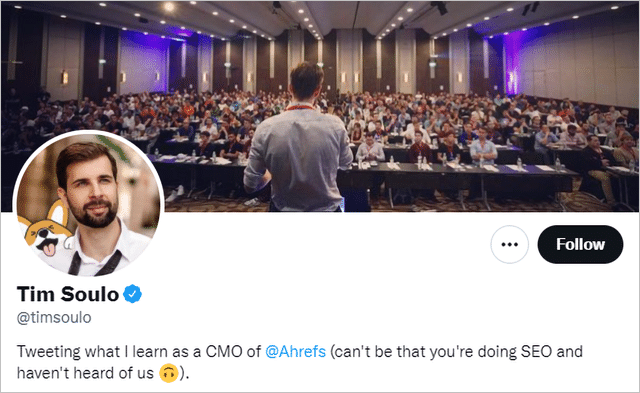
Tim Soulo is the Chief Marketing Officer at Ahrefs and a regular keynote speaker and podcast guest. Outside of his regular data research studies found on the Ahrefs’ blog, Tim is a frequent speaker at the largest SEO conferences like PubCon and Brighton SEO.
James Reynolds
Founder at SEO Sherpa
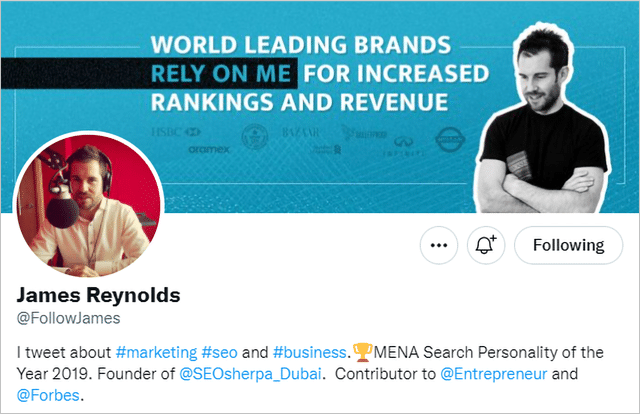
The Head Sherpa at SEO Sherpa, James Reynolds is fanatical about all things search, marketing, and entrepreneurship. James regularly publishes thought leadership insights on his LinkedIn profile and SEO advice on the SEO Sherpa blog.
When it comes to SEO experts, particularly proven ones, this list is just a glimpse of the plethora of thought leaders out there. If you’d like a more substantial list to follow, Search Engine Journal has built out this highly curated selection of Twitter accounts.
Feel free to give each one a follow.
Should You Hire an SEO Agency or Consultant?
I hope this article gives you the basics of how to build a solid SEO foundation.
At this point, you may start to realize how fast-paced and involved the SEO field actually is.
To truly excel in SEO, business owners and marketers need to be willing to continuously learn and commit the time necessary to learn how to optimize your site and its content effectively.
Because of the time and commitment, it takes to improve their business’s online search visibility, only 49% of small businesses invest in SEO or pursue targeted SEO efforts.
This begs the question, should you hire an SEO agency?
The short and quick answer is, maybe.
Not all SEO agencies are built equal. Some make promises or guarantees that may be impossible to keep. And bringing an SEO agency on board can be a considerable investment. To help you distinguish the right SEO partner for your business, read up on our SEO consumer guide.
But, if you partner with the right SEO agency, not only will you see your business get found first in search engines, you’ll be able to uncover new business opportunities which can maximize your return on investment.
At SEO Sherpa, we believe in white hat, organic SEO services. Our best-in-class team of 40+ SEO specialists manages more than 75 companies and has delivered award-winning SEO campaigns for startups and world-leading brands.
If you’d like to grow your business the right way, with proven, organic SEO strategies, jump on a discovery call today or leave a comment below.
